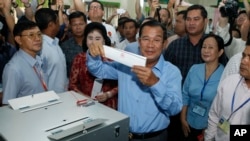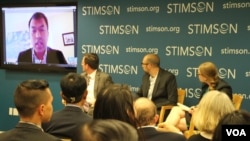The Cambodian People’s Party won an overwhelming victory at the general election on Sunday, picking up all 125 seats in parliament in the absence of an established opposition party. The National Election Committee (NEC) reported high voter turnout, despite calls for a boycott led by the banned Cambodia National Rescue Party and amid a campaign of intimidation.
Prior to the election, experts questioned the legitimacy of a vote held in such circumstances.
Astrid Noren-Nilsson, a senior lecturer at Lund University in Sweden, in an article published by the East Asia Forum on July 22, said the CPP would, in the likelihood that it won a resounding victory, “increasingly allude to the merits of the de facto one-party rule while continuing to fervently protect the formalities of multi-party democracy.”
Sophal Ear an associate professor at Occidental College in Los Angeles, said the outcome of the elections would be a “wasted opportunity” that would force Cambodians to the polling stations without giving them a real choice.
“Instead you force them to go vote and to put their finger in ink and say ‘if you don't put your finger in the ink and prove to us that you voted you, somehow, didn’t do your civic duty’’,” he said.
Legitimacy
Ou Virak, founder of the Future Forum think tank, said despite the CPP’s victory being predictable, the party would now have a tough time seeking to appear legitimate.
“The government is legal, but illegitimate. Even though the new government will be legally formed, there might be a problem in the eyes and hearts of the people because they [the CPP] won without any competitors. The new government is under strong pressure from Cambodians because the people didn't elect the new government freely,” he said.
“For me, the new government needs to be perfectly organized to gain legitimacy from its citizens,” he added.
Sebastian Strangio, author of “Hun Sen’s Cambodia”, said the reported high voter turnout would do little to assuage concerns over illegitimacy.
“Each Cambodian election has been plagued by the allegation of manipulation, fear, intimidation, and various forms of vote buying,” he said.
Both nationally and internationally, the CPP will have a difficult time explaining its uncontested win in the election, experts agree.
Sorpong Peou, a professor at Ryerson University in Toronto, quoted in The Diplomat, said “the lack of legitimate state institutions has left Cambodia more or less in the Hobbesian ‘state of nature’, and the politics of survival remains intense. Thus, I don’t expect Hun Sen and his CPP to go down without a fight to the death. For me, this is the great Cambodian tragedy.”
Despite widespread condemnation of the election process, legitimacy in the eyes of Cambodians may be a more complex issue. “The idea that the government has to be democratically elected in order to be legitimate is an idea that is contested by some. The Chinese government is not elected, but they actually enjoy quite high approval ratings and quite large popular legitimacy because it delivered economic growth and things like that,” added Strangio.
Virak of the Future Forum, however, agreed.
“Many Cambodians rejected the result, but, as I said, in the end, the people don't care about politicians or political parties. They care about the country and their lives. If the new government—even facing many criticisms for this election—is well organized and effective and has people who can prepare the policy addressing national issues, I think people will accept it,” he said.
Sanctions
Both the European Union and United States placed limited sanctions on Cambodia ahead of the election, with the E.U. also considering removing Cambodia from a preferential trading scheme that sees Cambodian garments enter Europe at greatly reduced tariffs.
But while the political pressure will be brought to bear on Hun Sen, economic pressure, which could be far more effective in securing compliance with international human rights commitments, could be less forthcoming, says Strangio.
"Investors like stability. The business community generally is quite supportive of the CPP government. I don't see that changing anytime soon. As long as they can maintain political stability and they prevent any sort of disruptive opposition movement, I think we'll likely see business as usual," he said.
“One risk I suppose, an external risk, is that the EU and the US decide to withdraw trade preferences from the Cambodian government, preferential trade to access to their market. That could potentially destabilize a large industry in Cambodia. But, they [E.U. and the U.S.] realize this step would be risky and would hurt a lot of ordinary workers before it hurt people in power,” he added.
As the west retreats from fostering close relations with Hun Sen, China has stepped up its engagement, providing Cambodia with billions of dollars in aid and investment.
While some commentators have expressed concerns that an over-reliance on one major power leaves Cambodia exposed diplomatically, Hun Sen has said he is not concerned by such developments. “For me, I have no concern over the influence of China or anyone. Our main problem is that we need to make more efforts to foster development,” he told filmmaker Robert Lieberman in a 2015 interview.
But for ordinary Cambodians, Chinese investment has come at a cost.
"Ordinary Cambodians have not benefited much from Chinese investment. There have been negative effects from Chinese investment. Either they lost their land to the Chinese development project or a Chinese dam, or they have not been employed on Chinese projects," Strangio said.
Chinese aid cannot replace trade with Europe should the E.U. decide to increase tariffs on Cambodian goods, says Virak, adding that the last time Cambodia received sanctions from the west after Hun Sen led a coup to seize power in 1997, the country was further impoverished as a result.
“We were poor in 1997. If we want to be poor as we were in 1997, we can go that way. In the 1980s, we were extremely poor, if we altogether want to be poor, we can go that way,” he said.
Young Voters
Milton Osborne, an author of “Pol Pot Solved the Leprosy Problem”, in an article published on The Interpreter, said Cambodia’s young population will be the leading influence on the future of the country. “Analysis of the 2013 national election, in which the CPP’s vote declined significantly, suggested that social media and the voting pattern of young Cambodians had begun to play an important part in shaping political opinion,” he wrote.
Sokry Zahron, a member of Politikoffee, a youth political discussion group, told VOA Khmer that young people have the potential to have a huge influence on Cambodian politics because they comprise a significant share of the population. “Starting in early 2015 or late 2014, some politicians started engaging youth in their parties. Youth is potential for development in Cambodia because youth make up about 60 percent of the total population,” Zahron said.
Sophal of Occidental College expects the young Cambodians to play a pivotal role in the future.
“Of course there are good people on all sides. There are people who are decent and reasonable. But, the problem is [that] they are working in the system. There is a political culture that is different. There is a culture of corruption that is already embedded in the country. I expect that young people even if they’re part of the elite are going to change the system that is already built around an expectation of payment,” he said.












